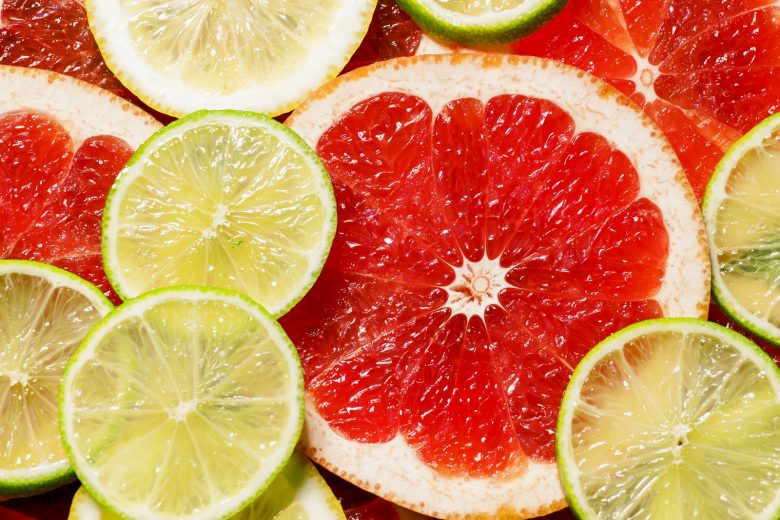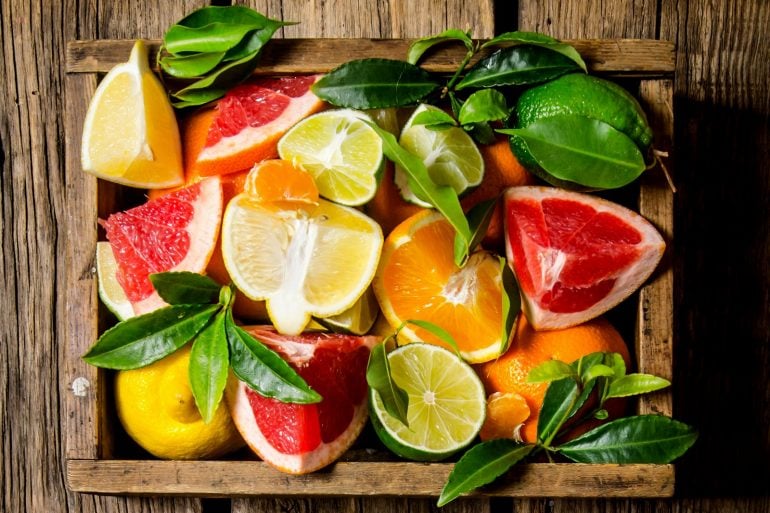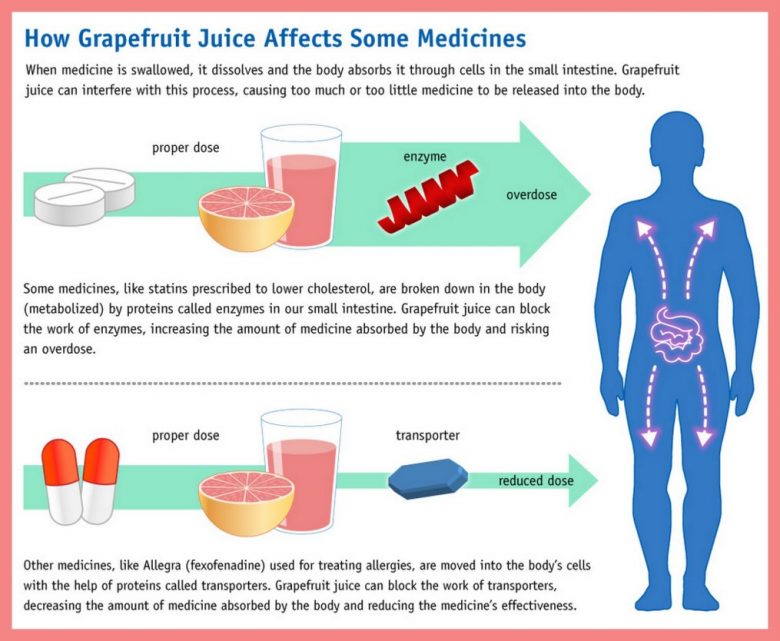Grapefruit juice can be part of a healthy diet — most of the time. It has vitamin C and potassium, both of which your body needs to work properly.
But yeah — there’s a problem: it isn’t good for you when it affects the way your medicines work.
Weirdly enough, grapefruit juice — along with fresh grapefruit and limes — can interfere with the action of some prescription drugs, as well as a few non-prescription drugs. Here’s the scoop.
Grapefruit juice and medicines – drug interactions
This is something you and your family need to know, especially as we all get older, and might need some of the medicines that help with lowering cholesterol and blood pressure, as well as preventing heart arrhythmia.
According to research published in 2012, there are more than 85 different drugs that may interact with grapefruit, and 43 can have serious side effects — including acute kidney failure, respiratory failure, gastrointestinal bleeding, bone marrow suppression in immunocompromised people, renal toxicity… and even death.
With most drugs that interact with grapefruit juice, “the juice increases the absorption of the drug into the bloodstream,” says Shiew Mei Huang, acting director of the FDA’s Office of Clinical Pharmacology. That means more of the drug is floating around in your body, which can lead to problems.
For example, if someone drinks a lot of grapefruit juice while taking certain statin drugs to lower cholesterol, too much of the drug may stay in the body, increasing the risk for liver damage, and consequential muscle breakdown that can lead to kidney failure.
This doesn’t mean only that you shouldn’t wash down meds with juice, but you should avoid it for a lot longer than that. Huang says that drinking grapefruit juice several hours before or several hours after you take your medicine may still be dangerous.
The no-no grapefruit list
Here are a few of the types of drugs that grapefruit juice can interact with:
Some antihistamines, such as Allegra (fexofenadine)
Some statin drugs to lower cholesterol, such as Zocor (simvastatin), Lipitor (atorvastatin) and Pravachol (pravastatin)
Some blood pressure-lowering drugs, such as Nifediac and Afeditab (both nifedipine)
Some organ transplant rejection drugs, such as Sandimmune and Neoral (both cyclosporine)
Some anti-anxiety drugs, such as BuSpar (buspirone)
Some anti-arrhythmia drugs, such as Cordarone and Nexterone (both amiodarone)
Grapefruit juice does not affect all the drugs in the categories above. Be sure to ask your pharmacist or another health care professional to find out if your specific drug is affected.
Here’s why grapefruit juice and medicine may not mix
When the drug’s too much or too little
Many drugs are broken down (metabolized) with the help of a vital enzyme called CYP3A4 in the small intestine. Certain substances in grapefruit juice block the action of CYP3A4, so instead of being metabolized, more of the drug enters the bloodstream and stays in the body longer. The result: potentially dangerous levels of the drug in your body.
The amount of the this enzyme in the intestine varies from person to person, says Huang. Some people have a lot, others just a little — so grapefruit juice may affect people differently even when they take the same drug.
While scientists have known for several decades that grapefruit juice can cause a potentially toxic level of certain drugs in the body, Huang says more recent studies have found that the juice has the opposite effect on a few other drugs.
For example, “Grapefruit juice reduces the absorption of fexofenadine,” says Huang, decreasing the effectiveness of the drug.
Fexofenadine (brand name Allegra) is available in both prescription and non-prescription forms to relieve symptoms of seasonal allergies. Fexofenadine may also be less effective if taken with orange or apple juice, so the drug label states “do not take with fruit juices.”

It’s not just grapefruit
As suggested above, grapefruit and grapefruit juice is not the only things can cause problems.
Other citrus fruits, such as Seville oranges (often used in marmalade), limes and pomelos also contain the active ingredients (furanocoumarins), according to research published in the Canadian Medical Association Journal.
These chemicals are innate to the fruit and cause the interaction by irreversible inhibition of the drug metabolizing CYP3A4 enzyme that normally inactivates the effects of an estimated 50% of all medication.
Drugs that interact with these chemicals have three characteristics: they are administered orally, they have very low to intermediate bioavailability (percentage of the oral dose of drug absorbed into the blood circulation unchanged), and they undergo drug metabolism in the gastrointestinal tract by the enzyme.
For drugs with very low bioavailability, ingestion of a single normal amount of grapefruit can be analogous to consuming multiple doses of the drug alone.
Why does grapefruit create this opposite effect?
It involves the transportation of drugs within the body rather than their metabolism, explains Huang. Proteins in the body known as drug transporters help move a drug into cells for absorption.
Substances in grapefruit juice block the action of a specific group of transporters. As a result, less of the drug is absorbed and it may be ineffective, Huang says.
When a drug sponsor applies to FDA for approval of a drug, the sponsor submits data on how its drug is absorbed, metabolized and transported says Huang. “Then we can decide how to label the drug.”
FDA has required some prescription drugs to carry labels that warn against consuming grapefruit juice or fresh grapefruit while using the drug, says Huang. And the agency’s current research into drug and grapefruit juice interaction may result in label changes for other drugs as well.
Grapefruit and medicine: Tips for everyone
Ask a pharmacist or other health care professional if you can have fresh grapefruit or grapefruit juice while using your medication. If you can’t, you may want to ask if you can have other juices with the medicine.
Read the Medication Guide or patient information sheet that comes with your prescription medicine to find out if it could interact with grapefruit juice. Some may advise not to take the drug with grapefruit juice. If it’s OK to have grapefruit juice, there will be no mention of it in the guide or information sheet.
Read the Drug Facts label on your non-prescription medicine, which will let you know if you shouldn’t have grapefruit or other fruit juices with it.
If you must avoid grapefruit juice with your medicine, check the label of bottles of fruit juice or drinks flavored with fruit juice to make sure they don’t contain grapefruit juice.
Beyond grapefruit: Seville oranges (often used to make orange marmalade) and tangelos (a cross between tangerines and grapefruit) affect the same enzyme as grapefruit juice, so avoid these fruits as well if your medicine interacts with grapefruit juice.
The Canadian study reminds people to volunteer information about any grapefruit they’re eating — don’t wait for the doc to ask.
“Unless health care professionals are aware of the possibility that the adverse event they are seeing might have an origin in the recent addition of grapefruit to the patient’s diet, it is very unlikely that they will investigate it,” write the authors. “In addition, the patient may not volunteer this information. Thus, we contend that there remains a lack of knowledge about this interaction in the general healthcare community.”









